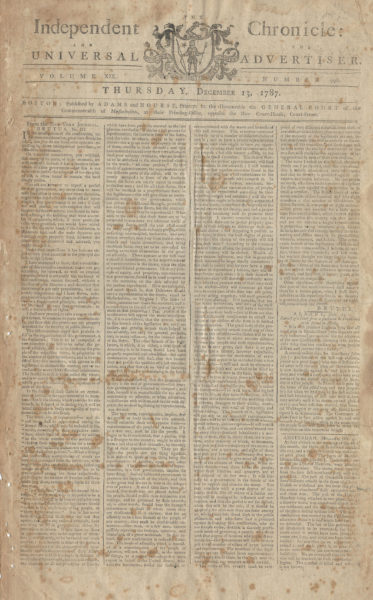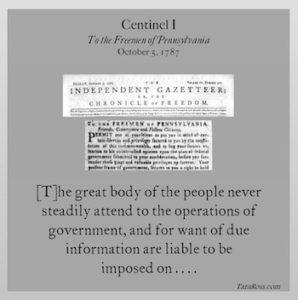 In contrast to Hamilton, Madison and Jay who supported ratification of the Constitution of the United States, many others did not. While the former’s works were more logically organized (and eventually won the debate), the Anti-federalist writers were nonetheless articulate. Serious questions were raised which eventually led to some of the Federalist writings that served as answers to allegations of the Anti-federalists.
In contrast to Hamilton, Madison and Jay who supported ratification of the Constitution of the United States, many others did not. While the former’s works were more logically organized (and eventually won the debate), the Anti-federalist writers were nonetheless articulate. Serious questions were raised which eventually led to some of the Federalist writings that served as answers to allegations of the Anti-federalists.
No serious student of the Constitution can be without both sides of the story. Some Anti-federalist prophecies have strangely come true. Writings by “Brutus” and “A Federal Farmer”, particularly relating to the “necessary and proper” clause (Article I, Section 8, Clause 18), view the future under an unrestrained Congress. Although the “necessary and proper” clause was never meant to be a blanket grant of power, over the years, as the intentions of the Founding Fathers have passed further and further from our memories, all three branches of the federal government have assumed powers that simply do not – and never did – exist. As the states have forgotten how to be a check against a Congress run amok, things are getting worse.
This document has been spell checked and proof-read it several times. Spelling and grammatical errors of the period in which these works were written, have for the most part been left intact. Undoubtedly, we may have missed a dropped character, hyphenation may be inadvertently missing, or other minor flaws may appear.
This work is considered public domain to the extent that the information is historic, and intended for non-commercial, informational purposes. In addition, our purposes in making this entire body of work available are several-fold: First, for the education of the American people so that we might better understand our nations history. Secondly, so that we might be able to use this information as a tool of reference as we contact our elected state and federal officials in order that we might right was has been terribly wronged in our great Republic.
These documents, like the Federalist Papers, themselves, cannot be considered all-inclusive. Many other pro and con pieces appeared in newspapers, in the state ratification conventions, in pamphlets, books, and other sources of the time. But these are considered the premier Anti-federalist writings organized somewhat to coincide with the Federalist Papers.
You will note below, that we have also separately posted the works of one ‘Centinel’ out the works of to focus on for reasons that will become important to this project.

 Samuel Bryan of Pennsylvania
Samuel Bryan of Pennsylvania
Samuel Bryan (September 30, 1759 in Philadelphia — October 6, 1821 in Chester County, Pennsylvania) was a resident of Pennsylvania and Anti-Federalist author, who wrote during the Confederation Period. Historians generally ascribe to him the Letters of Centinel written under the pseudonym Centinel between 1787 and 1789. Centinel attacked the proposed Constitution of the United States as a document in the interests of the “well-born few”. He was the son of George Bryan, a judge on the Pennsylvania Supreme Court and the principal Anti-Federalist in the state, to whom the essays were frequently attributed at the time they were written.
Centinel wrote three series of essays. The first eighteen numbers appeared in late 1787 and early 1788, and reflected the Anti-Federalist opposition to the Constitution. Letters XIX through XXIV were produced toward the end of 1788. By this time, the Constitution had been adopted, and these essays sought to sway the election of representatives to the new government. In 1789, a final series of 69 papers appeared regarding proposed amendments to the Constitution.
There is a difference of opinion with respect to what to call the opponents of the Constitution. The Federalist Papers referred to them as the antifederalists, degrading them to a position of irrelevance and incoherence. Some modern scholars, by contrast, capitalize their name but then hyphenate it, making them Anti-federalists – relevant, but incoherent. We have chosen the nomenclature “Antifederalist” in order to encourage the reader to see their remarks as both relevant and coherent.
This essay of “Centinel” offered one of the earliest public Antifederalist critiques of the Constitutional framers’ work as the ratification process began. He opens his remarks, addressed to the Freemen of Pennsylvania, with a reminder and a question: the essential liberties of the people are secured in the Pennsylvania Bill of Rights; are they secure under the proposed Constitution? He suggests that “all the blessings of liberty and the dearest privileges of freemen are now at stake and dependent on your present conduct.”
Beware, he adds, the work of “artful and designing men.” Unfortunately, Centinel contends, the Convention was inspired by John Adams’s political thought on “good government,” which presumed a balancing of the three functions of government – legislative, executive, and judicial – in three branches. According to Centinel, this means that the Constitution does not rely on the virtue of the people; it simply balances the powers of those governing them. “A republican, or free government, can only exist where the body of the people are virtuous, and where property is pretty equally divided,” Centinel maintains. Furthermore, the plan encourages the exercise of extensive powers by the general government – see the general welfare clause and the supremacy clause – over an extensive territory, which is a recipe not “for a regular balanced government” but for “a permanent ARISTOCRACY.”
Centinel concludes that 1) the new Constitution does not include a bill of rights to ward off future crises and 2) no such crisis exists compelling adoption of the Constitution right away. That we are in crisis “is the argument of tyrants.” We need to follow the wisdom of the French political theorist Montesquieu (whose Spirit of the Laws was widely read among the Framers) concerning the size and homogeneity of republics; if they were to remain free, they need to be small, and their citizens had to have common interests.
The “Centinel” series comprised 24 separate essays, published in the Philadelphia Independent Gazetteer and the Philadelphia Freeman’s Journal, the last appearing November 4, 1788. This first Centinel essay was republished in several other newspapers. (SOURCE)
The Anti-Federalist Papers: Centinel I
On October 5 1787, an author writing under the pseudonym “Centinel” writes his first contribution to the anti-Federalist Papers. These papers argued against the new Constitution, then being considered for ratification by the states. Their authors were not working together in any type of organized fashion, as the writers of the pro-Constitution Federalist Papers were.
 This particular author, “Centinel,” was Samuel Bryan of Pennsylvania, although it is possible that Eleazer Oswald contributed a few pieces.
This particular author, “Centinel,” was Samuel Bryan of Pennsylvania, although it is possible that Eleazer Oswald contributed a few pieces.
Centinel is upset about the lack of a Bill of Rights. How can Pennsylvanians know that they will be free from search and seizure? Or that they will have a right to jury? Or freedom of speech? It is not clear to Centinel that any of these rights will remain inviolable if the Constitution is adopted. Pennsylvanians have these rights now. Why give them up?
He further worries about the fact that George Washington and Benjamin Franklin have put their stamp of approval on the Constitution. Would Americans be too quick to accept the Constitution, without further investigation, simply because Washington and Franklin deemed it okay? Centinel is afraid that, despite “purity of intention,” those two men “may be made instruments of despotism in the hands of the artful and designing.”
Actually, Centinel is a bit condescending in this section of his essay. Washington, he says, “has been imposed on, in a subject of which he must be necessarily inexperienced.” He deemed Franklin simply too old, citing the “weakness and indecision attendant on old age.”
He wonders why the Constitution’s supporters expect a balancing of powers among three branches to work. He thinks it is impossible to keep three branches co-equal. Instead, one of the branches will begin to overwhelm the others. “[T]here is so great a disparity in the talents, wisdom and industry of mankind,” Centinel remarks, “that the scale would presently preponderate to one or the other body, and with every accession of power the means of further increase would be greatly extended.”
A more “simple structure of government” would work better. The “great body of the people never steadily attend to the operations of government, and for want of due information are liable to be imposed on.” In the end, he thinks that the “people will be perplexed and divided in their sentiments about the source of abuses or misconduct, some will impute it to the senate, others to the house of representatives, and so on.” The people will be too divided to hold their representatives accountable.
Adding to the problem, too much power has been given to Congress. Its vast taxing and legislative powers, taken together, will “necessarily absorb the state legislatures.” Centinel envisions these tyrannical taxes being “enforced by the standing army, however grievous or improper [the taxes] may be.”
Hmm. Were his fears justified?
Centinel does not believe the states should be in a rush to act. Surely, he concludes, a second constitutional convention can come up with something better than what has been proposed! (SOURCE)
Political career
In 1784, Bryan became the secretary of the Pennsylvania Council of Censors, and was elected clerk of the state assembly in 1785. In 1790 he ran for the office of clerk of the state senate, but lost. In 1795 he was appointed state register general by Gov. Thomas Mifflin. In 1801 he became state comptroller general. In 1807 he lost a race for state treasurer. From 1809 to 1821 he served as Philadelphia register of wills. (SOURCE)

Who’s here so base, that would a bondsman be?
If any, speak; for him have I offended.
Who’s here so vile, that will not love his country?
If any, speak; for him have I offended. ~ Julius Caesar, Act 3, Scene 2
The Anti-Federalist Papers – COMPLETE.pdf
The Anti-Federalist Papers by Centinel.pdf
